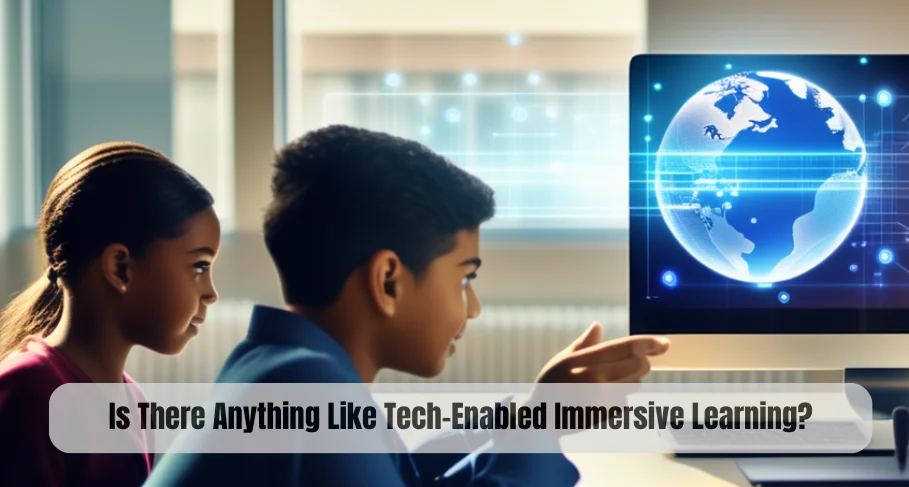The debate on the place of technology in education has been around since we started initiating tech integration. The transformative potential of edtech and the inherent risks of the digital age often fuels it. So, is immersive learning at the hands of technology?
In this post, we dive further into analysing where tech integration stands when discussing education.
Stated more specifically, this article is about the very nature of education and learning, briefly exploring if the two are amenable to ‘technology’ in any materially significant ways. First and foremost, let us secure a common ground on what technology is about. Technology is the application of the sciences (the definitive laws discovered by us about how nature/universe works) by us. Still, we know little about biology in general, how we learn, or how our brain really works, in particular.
The science of life and learning is fairly limited to being able to develop ‘technologies’ around it (technology is 100% mathematised scientific laws in applications, oversimply stated ‘automating a certain set of actions’). It is naive to think of building technology for better, let alone immersive, learning.
By implication, if there is any ‘technology’ to be built about education and learning, it is what I call ‘Technology OF Education,’ specifically contrasting it with ‘Technology IN Education’ (this is what the Edtech industry is focused upon.) In the former, the focus is on education, on ‘deciphering the science of organising teaching and learning at a mass scale’ and then harnessing the appropriate kind and level of technology; the ‘hi-techness’ of technology is no consideration. It is best led by educators who are competent technologists, too.
In the latter, state-of-the-art technology is the focus; how it secures learning goals is hardly even understood; it is led by technologists with supplementary education experience at best. Exploiting education as a domain for selling technology is indeed wrongly committed against children and society; Edtech is not promoting learning gains and, in many ways, complicating educational achievements.
Fundamentally, education is almost entirely social, immersed in family (everyone is born in a family), community, and society (its culture, economics, and ‘everyday technologies’.) In fact, education is the name given to the 2-decade-long ‘all that happens in raising an infant to a cultured adult,’ education is what makes us all truly human. The role of formal (education) institutions in ‘this education’ is purely due to the intensification of science (and technology), better understanding of nature and fuelling creativity. It is not a coincidence that the foundation of the formal was laid in the nineteenth century. It has been called the age of science for the incredible hope it gave to the possibilities of technology. Science had to be part of every child’s education, and the earliest schools were exclusively academic. Now, we are living in the most sci-tech of times that is affecting all the dimensions of life and living; academic excellence is a big part of educating children.
Interestingly and importantly, a quick peek into academic learning is due here to dispel the association between academics and technology. Science cannot be taught; it is rooted in observing and experiencing nature; we cannot simulate the undiscovered nature, and discovering nature is best studied as the ‘logical expression of consistent observations and experiences’. Basically, there is little technology needed to learn K-12 science.
Mathematics is best studied as the language of science (laws that capture order, definitiveness of nature can only be expressed mathematically); in fact, K-12 mathematics can only be mastered through ‘word problems’, i.e., in the ‘real world’. All natural languages are founded and finetuned in the community (and competent reading and writing that is, at best, average in the formal system.) Art, dance, music, play, sports, theatre, etc. are obviously physical. Social sciences are just too real.
Edtech, or Tech-Enabled Immersive Learning, is one of the most touted changes in the 200-year-old K12 system (the current form of global school education). It is the response of technologists, the technology industry, governments, and society at large towards contemporising what may be the only social institution that still operates almost exactly the way it was founded (this is a long story, for another few posts). For comparison, million-year-old institutions such as marriage and family have dramatically transformed globally in just a couple of decades, even in the most entrenched societies.
The education system has been defying gravity and has mostly failed in all initiatives and intents to overhaul it. Thus, how do we know if the ‘modernisation’ of K-12 through Edtech is truly and rightly changing it? Long story short, here are the five key educational challenges of our times. First, assuring ‘same quality’ academic outcomes of K-12 for first-generation learners and privileged learners to ensure everyone becomes a (net) producer; ‘Industry 4.0’ is the best news for humankind, for equally enabling all. Second, ensuring no child is left behind in mathematics, the language of life and business hereafter. Third, cultivating literary reading habits in one and all, the critical importance of highest reading ability cannot be overemphasised for thinking skills. Fourth is a mass-scale adult ‘re-education,’ including teacher re-education and instilling academic leadership in schools (recall that learning cannot be taught; it is a by-product of children’s environment). Fifth, ‘whole-child’ development that requires the inversion of the current school system (focused on academics that eat up over 6 of the 8 daily periods) – reaching two-thirds of timetable commitment and resources deployment on co-curricular learning.
Self-evaluate how any of the Edtechs are actualising any of the above, making learning any immersive to solve the aforementioned challenges.


